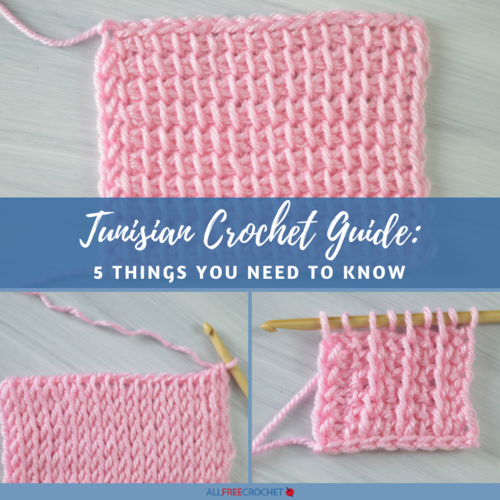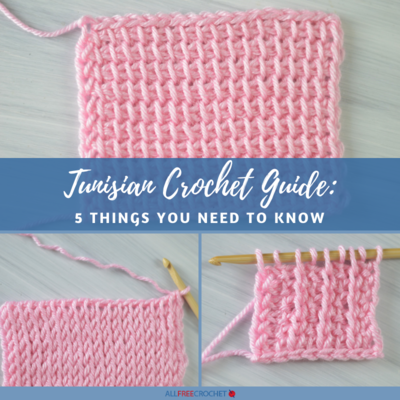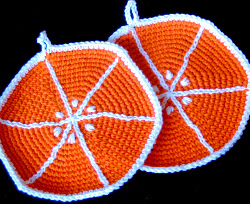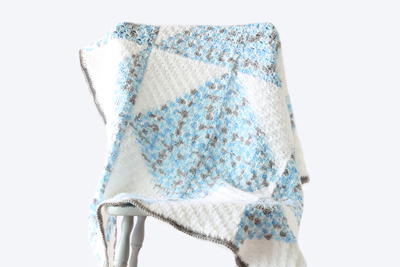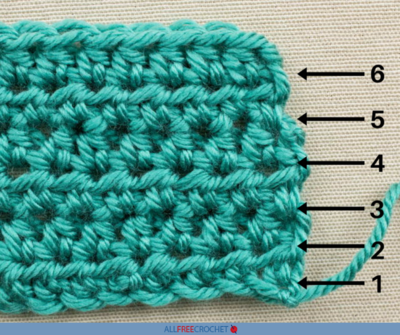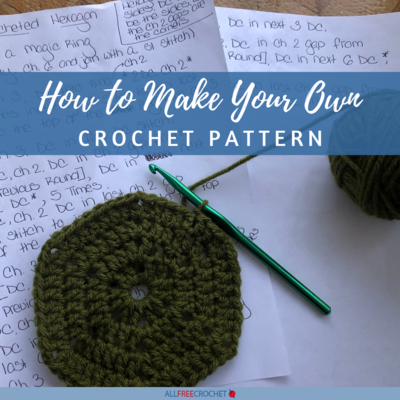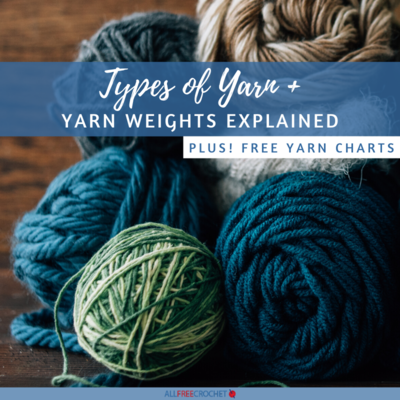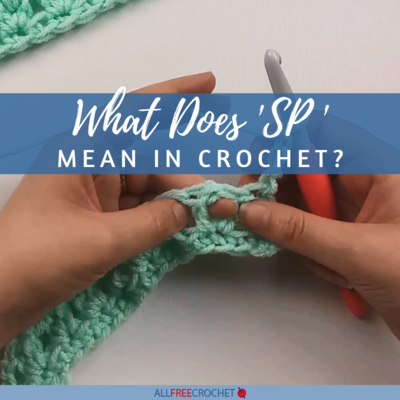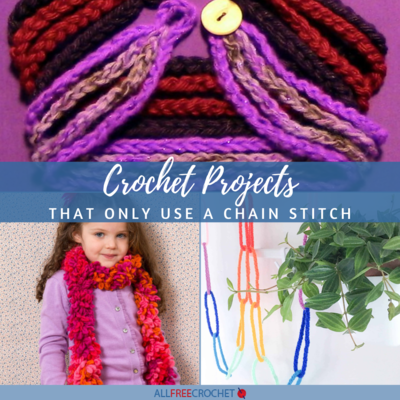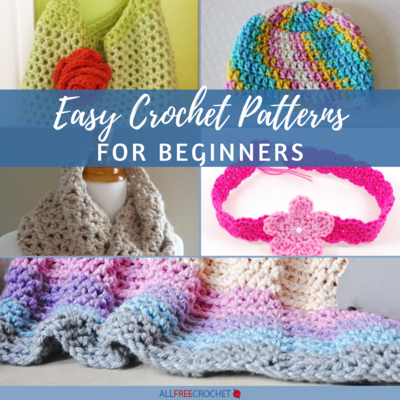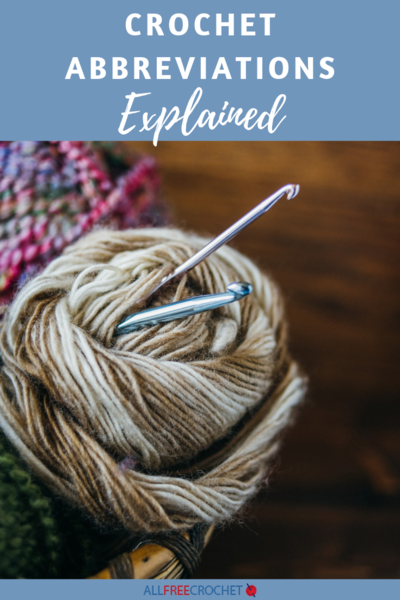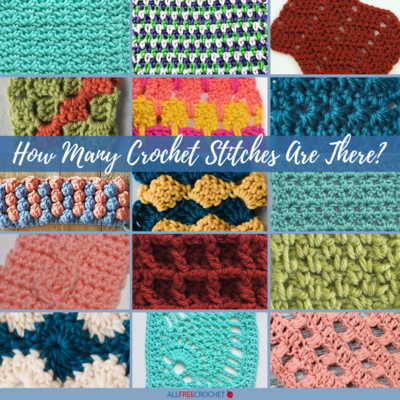Tunisian Crochet Guide: 5 Things You Need To Know
If you've been curious about afghan crochet (aka Tunisian), then read through this beginner guide and learn everything you need to know.
Tunisian Crochet 101:
You may be asking yourself, what is Tunisian crochet and why has it become so popular?
Tunisian crochet, also known as afghan crochet, is a form of crochet that combines knitting and crochet to mimic knitted or woven fabric. For a crocheter, it’s an easy way to get that coveted knitted look without technically knitting.
With this Tunisian Crochet Guide, learn the 5 things you need to know from Tunisian expert Alexandra Halsey at With Alex before getting started with this unique crochet technique.
Tunisian crochet can be used to make garments, blankets, and even amigurumi. Some Tunisian stitches can make a very dense, thick fabric that is perfect for winter garments, blankets, and amigurumi.
Other Tunisian stitches can create airy, lacy fabrics that are perfect for summer garments and projects that require a lace element.
Basically, with Tunisian crochet, you are picking up loops, which stay on your hook until you make a return pass to remove the loop from the hook to complete the stitch. This can be done flat, row by row, or in the round. Tunisian crochet is very repetitive and can be very meditative and relaxing.
PLUS! Alex just reviewed the Clover Tunisian Hook Set and is giving one away! Watch her unboxing video here and enter for your chance to win on her blog and her Instagram! Hurry, the giveaway ends 11/7/19.
Tunisian Resources
Before getting started, we're sharing some fantastic resources from Alex.
Tunisian crochet is a lot of fun and with it, you can make all kinds of different fabrics and projects. Remember to go slow, practice and don’t get discouraged. If you need any extra help, you can watch my video tutorials (shared below).
Once you have practiced and feel ready to try a pattern, the Beginner Tunisian Beanie is a perfect beginner project. The free pattern and video tutorial will be linked below. Happy crocheting!
Video Tutorials:
How To Tunisian Crochet With The Tunisian Simple Stitch
How To Tunisian Knit Stitch or tks
How To Tunisian Purl Stitch or tps
How To Tunisian Knit Stitch Decrease or tks2tog
How To Color Change And Carry Colors With Tunisian
FREE PATTERN! This brand new Beginner Tunisian Beanie is a great pattern for those just getting started in afghan crochet. The body of this beanie has a simple but beautiful knitted texture and the brim has a beautiful ribbing. This unisex beanie comes in 6 sizes and is comfortable and warm, perfect for this fall and winter season.

You can also watch the Beginner Tunisian Beanie Video Tutorial to see how it's done!
5 Things You Need To Know To Get Started With Tunisian Crochet
1. Tunisian Crochet Tools
The special tool needed for Tunisian crochet is called a Tunisian crochet hook or afghan hook. It is possible to practice or make small projects on a regular crochet hook that does not have a handle. There are 3 different types of common Tunisian crochet hooks. I suggest trying one that you feel will be the most comfortable for you.
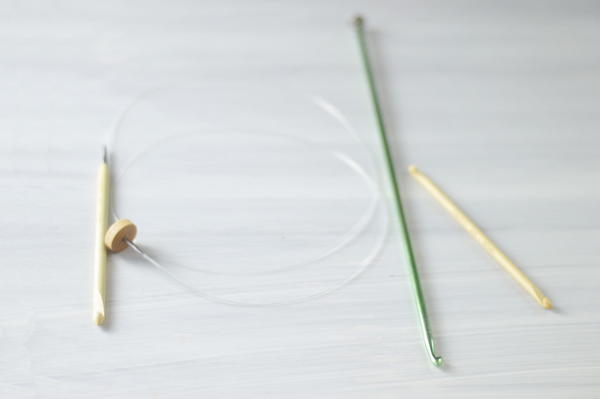
The Long Tunisian Hook
The longer Tunisian crochet hooks mostly come in either a 10 inch or 14-inch hook and are mostly made from aluminum. These hooks have a stopper on the end to keep your project from falling off of the hook.
The 14-inch hook can be awkward to use, especially if sitting in a chair with arms or at the end of a couch, the end will hit the arm of the chair if not positioned right. These can also be quite heavy as well, but they are great for beginners because they are relatively cheap and they are pretty easy to find.
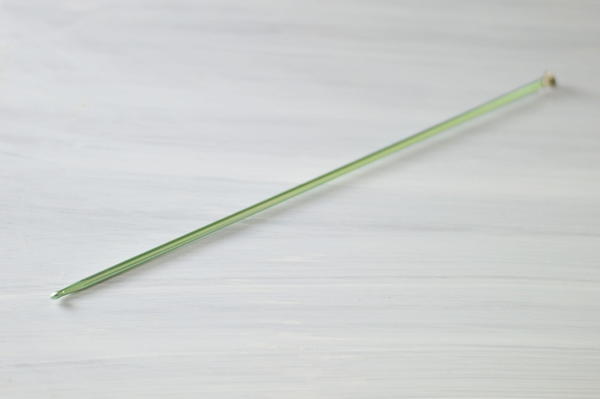
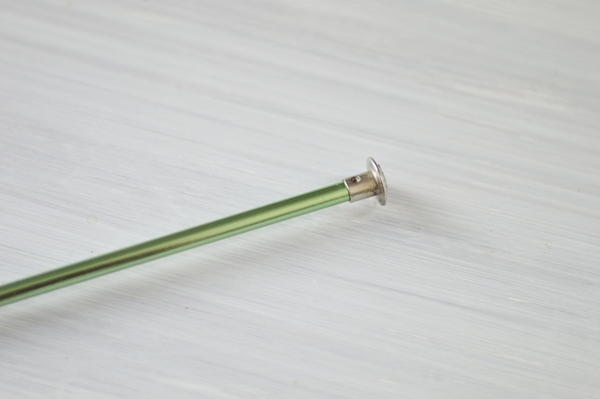
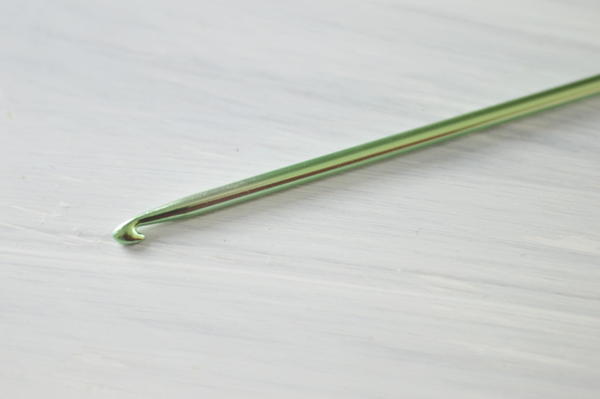
Tunisian Crochet Hook With Extension Cord
The second most common Tunisian crochet hook is the shorter Tunisian hook with an extension cord. There are 2 types of these. One type has a permanently attached cord with a stopper on the end. The other kind is interchangeable, like the Clover interchangeable Tunisian hook set that I reviewed. You can find the link to that article, below.
The cord can be screwed to the end of the size hook you would like to use and then the stopper is screwed onto the end of the extension cord. This kind is normally made from bamboo or plastic and they are lightweight. The wooden ones, like the Clover set, are my favorite to use because they are so lightweight and larger projects can be made on them, but they can be more expensive. An interchangeable set is a great investment for the serious Tunisian crocheter.
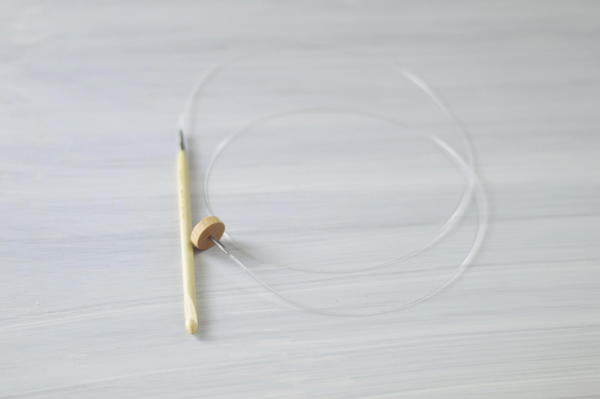
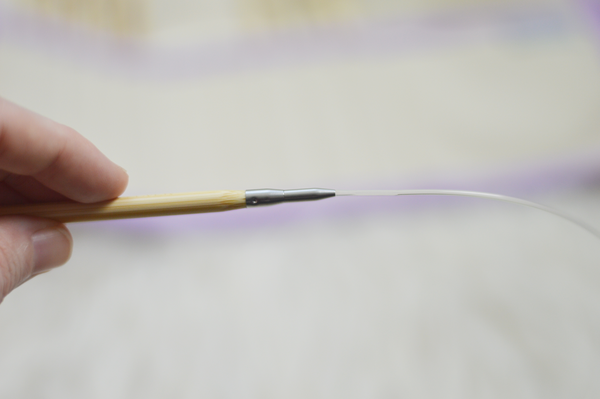
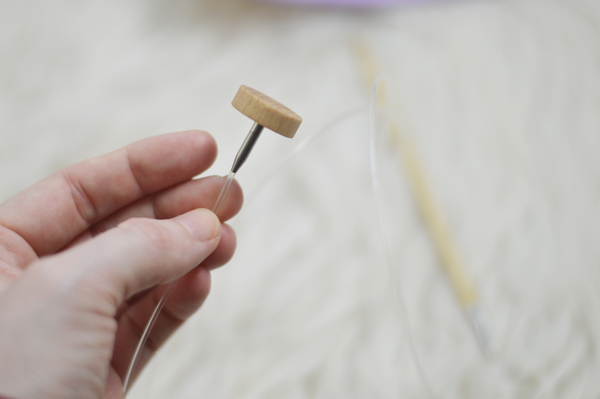
The Double Ended Tunisian Crochet Hook
The third most common Tunisian hook is a double-ended hook. These are used for working Tunisian crochet in the round. This hook is more of a specialty hook and is great for that specific project that is worked in the round.
These can also be used for Tunisian crochet worked flat, you may need to add a piece of tape or a rubber band to the end to keep the stitches from falling off of the hook. For larger projects worked in the round, there are double-ended hooks with a cord between the two ends.
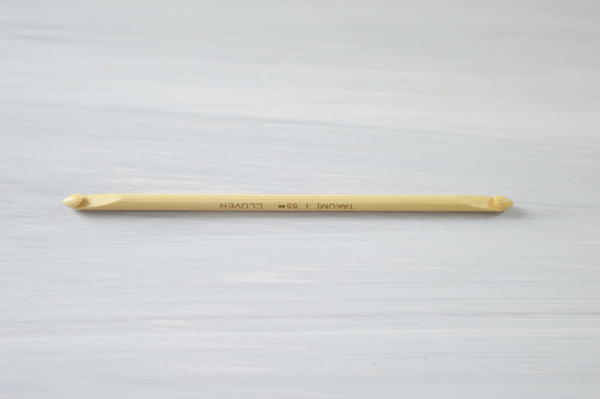
2. The 3 Common Tunisian Crochet Stitches
Tunisian Simple Stitch (or tss)
The Tunisian Simple Stitch or tss is a neat stitch that makes a dense, thick fabric that looks woven. The sample below has been blocked.
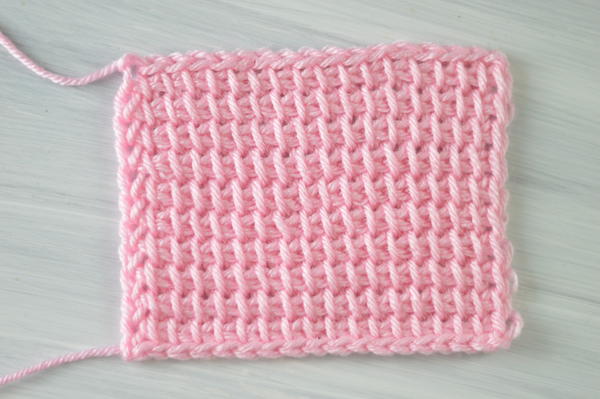
How to Make the Tunisian Simple Stitch:
- Insert the hook, behind the front vertical bar of the next stitch. (image 1 & 2)
- Yarn over. (image 3)
- And pull through the first loop on the hook to pull up a loop. (image 4)
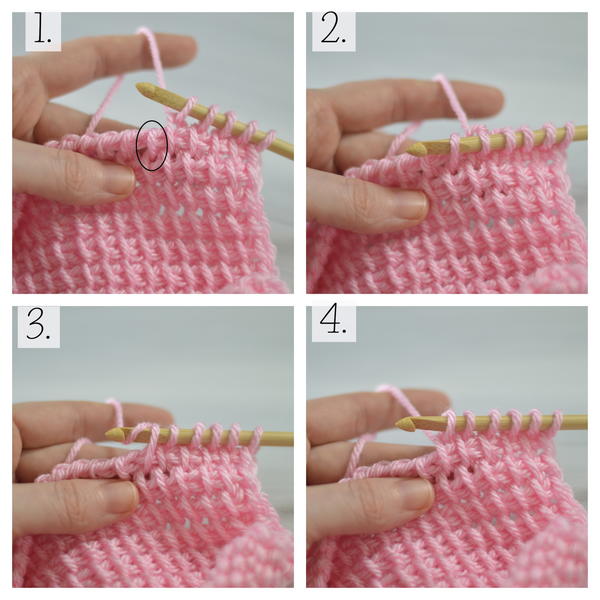
Tunisian Knit Stitch (or tks)
The Tunisian Knit Stitch or tks is a stitch that resembles knitted stockinette. The sample below has been blocked.
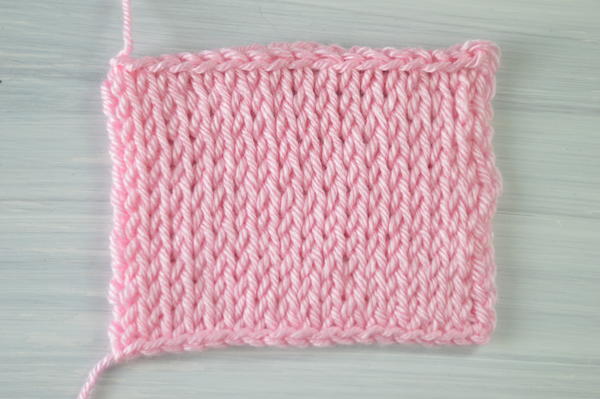
How to Make the Tunisian Knit Stitch:
- Insert the hook between the front and back vertical bars of the next stitch. (image 1 and 2)
- Yarn over. (image 3)
- Draw the yarn through the stitch to pull up a loop. (image 4)
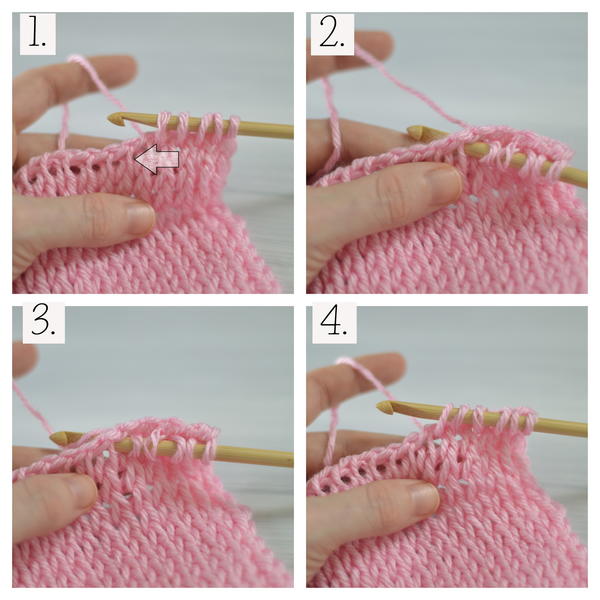
Tunisian Purl Stitch (or tps)
The Tunisian Purl Stitch or tps is a stitch that resembles the knitted purl stitch. The purl stitch looks like little bumps across the fabric made. The sample below has been blocked.
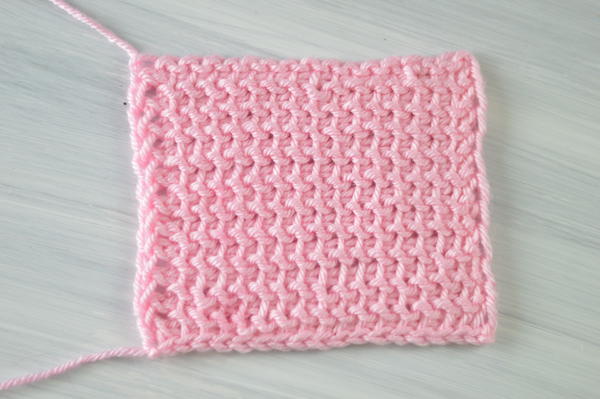
How to Make the Tunisian Purl Stitch:
- Bring the working yarn to the front of the hook. (image 1 and 2)
- Insert the hook behind the front vertical bar of the next stitch. (image 2 and 3)
- Hold the working yarn down with your thumb. (image 4)
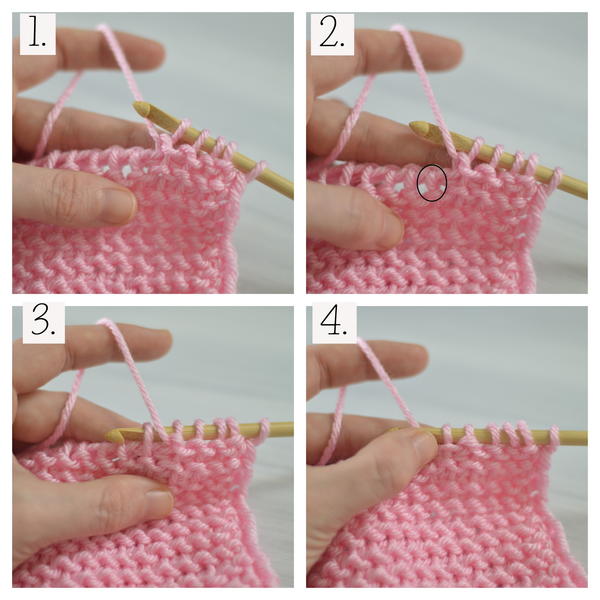
- While continuing to hold the yarn with your thumb, pull through the stitch to pull up a loop. (image 5 and 6)
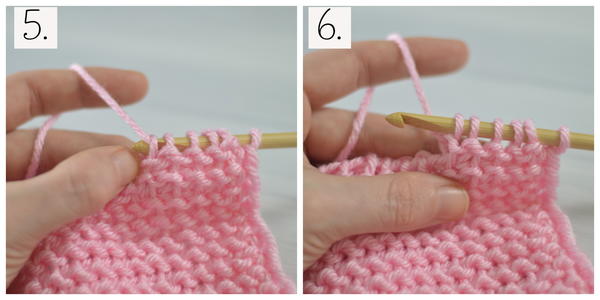
Simple Tunisian Ribbing
Simple ribbing can be made by alternating the Tunisian knit stitch and the Tunisian purl stitch. This resembles knitted ribbing.
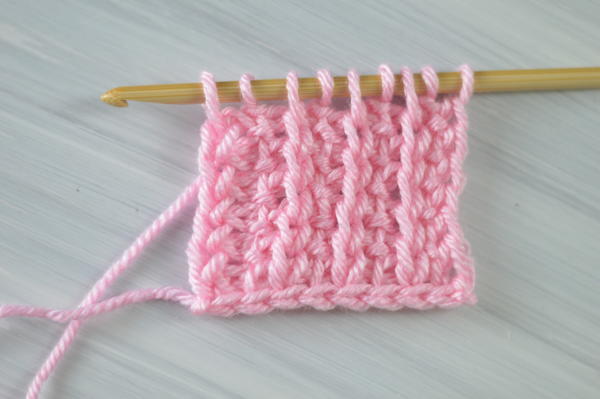
Tips for Tunisian Loop Tension
The loops can be tight on the hook or loose, depending on the gauge. You can adjust the loop size by pulling up on your hook after you have pulled up a loop.
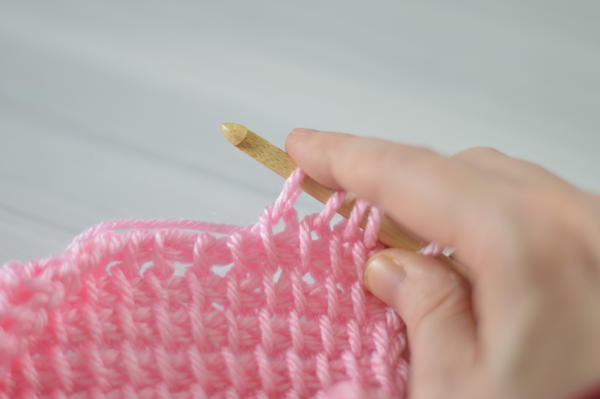
I like to keep the loops on my hook loose so that I can easily push the fabric up and down my hook, as needed. If you find that you are not meeting gauge by the height, try making your loops tighter or looser to get the right gauge.
The examples below show tight loops, loose loops, and even looser loops (from left to right).
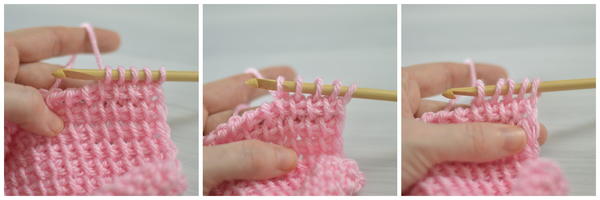
3. Why is My Afghan Stitch Curling?
Depending on what kind of project you are working on, your project will probably curl a bit. Don’t get discouraged, curling is completely normal!
If you're looking for how to keep Tunisian crochet from curling, there are a few ways to help. The main is blocking with pins after you have completed your project, which will help fix this problem. If you are making something with the purl stitch, it will curl less than the knitted stitch and the simple stitch. Also, if you alternate with the purl stitch, it will curl less. Below are images of the swatches before and after I blocked them.
The Tunisian Knit Stitch Swatch
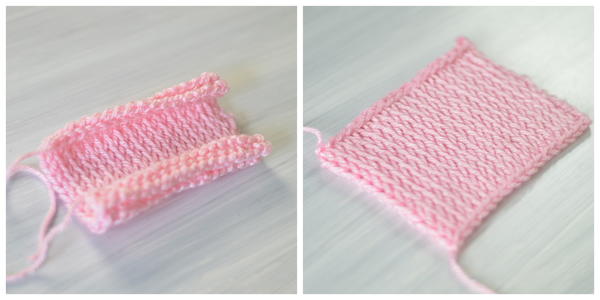
The Tunisian Simple Stitch Swatch
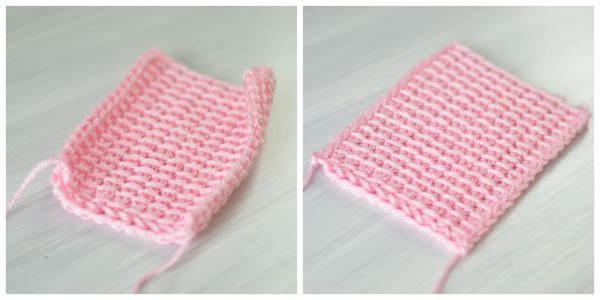
The Tunisian Purl Stitch Swatch
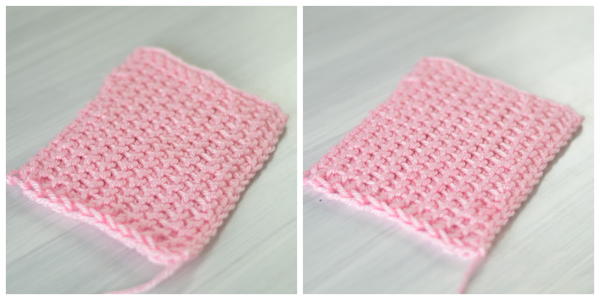
4. Tunisian Crochet Tutorial:
Each row of Tunisian crochet has a forward pass and a return pass. The forward pass is worked from right to left and the return pass is worked from left to right.
How To Tunisian Crochet:
Below is a picture tutorial that can be practiced with a regular crochet hook with no handle. Red Heart Soft and a size K Tunisian hook was used.
- Make a slip knot. (image 1)
- Chain 5. (image 2)
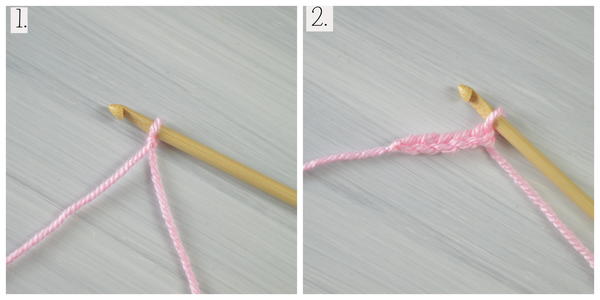
- Insert the hook into the 2nd chain from the hook, yarn over and draw through to pull up a loop. (images 1, 2, 3 and 4)
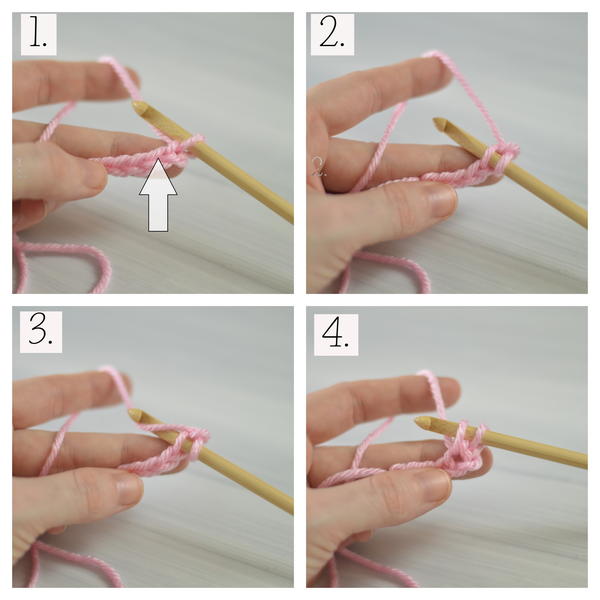
- Repeat step 2 across. You should have 5 loops on the hook. (below image)
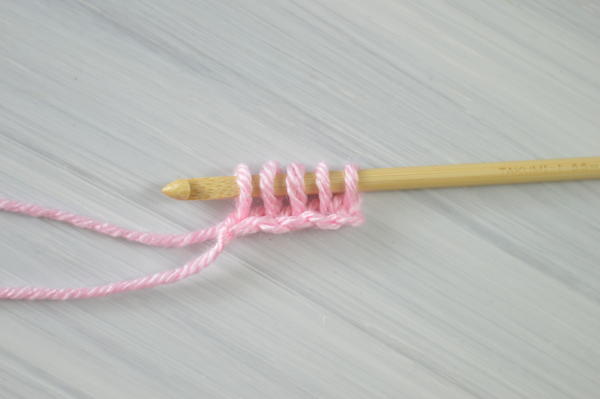
The Return Pass:
- Yarn over. (image 1)
- Draw through the first loop on the hook. (image 2)
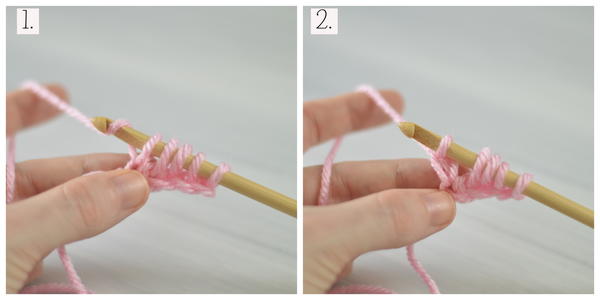
- Yarn over. (image 1)
- Draw through the next 2 loops on the hook. (image 2)
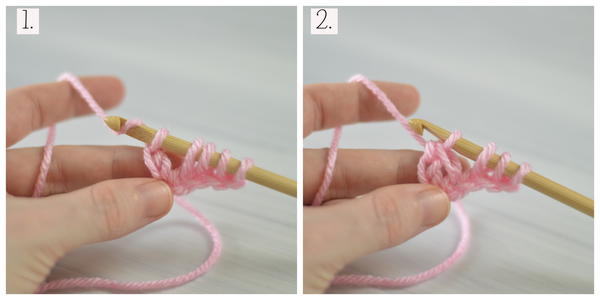
- Repeat steps 7 and 8 until you have 1 loop remaining on the hook. (below image)
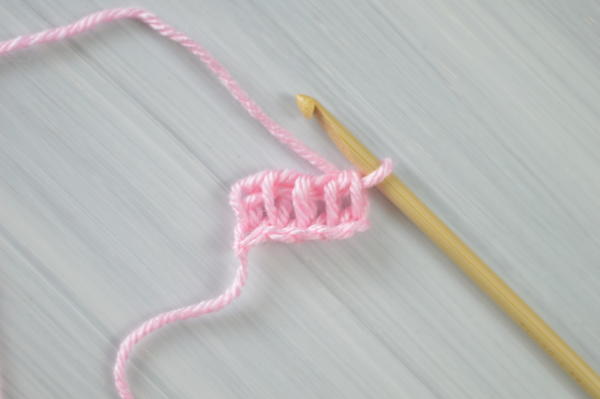
2nd Forward Pass:
(You may use whatever stitch you would like. For my example, I am using the tks)
- The first stitch is on the hook. Insert the hook into the next stitch and pull up a loop. Continue across until 1 stitch remains. (below image)
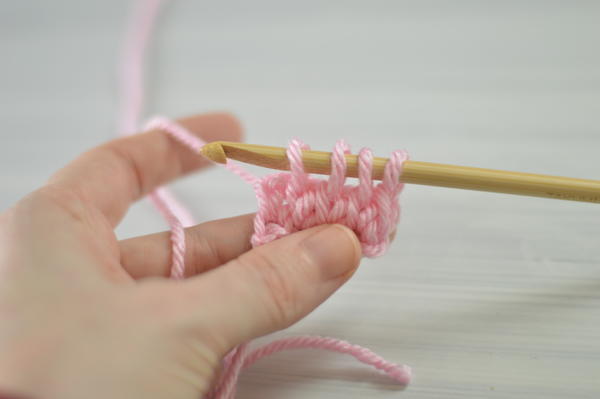
- To work into the last stitch, tilt the work a little and insert the hook under the last 2 vertical bars at the end of the row. (image 1 and 2)
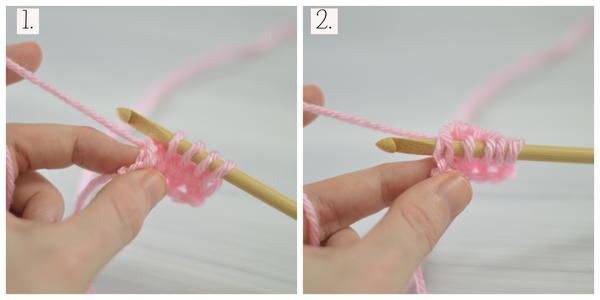
- Yarn over and pull through the stitch to pull up a loop. (image 1 and 2)
You should now have 5 loops on the hook.
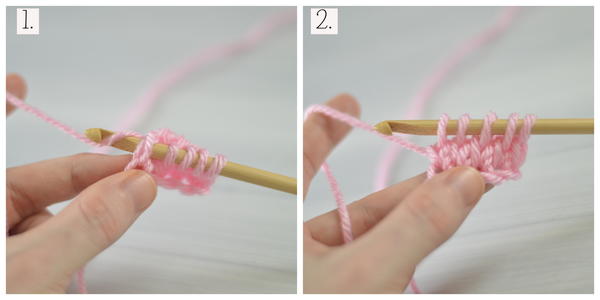
Now you can make a return pass the same as in steps 5-9.
Keep repeating these steps to practice.
5. How to End Tunisian Crochet:
As you can see in the image below, once you have completed the last row, the stitches are taller and look incomplete. To make a finished edge, you will bind off across the last row from right to left.
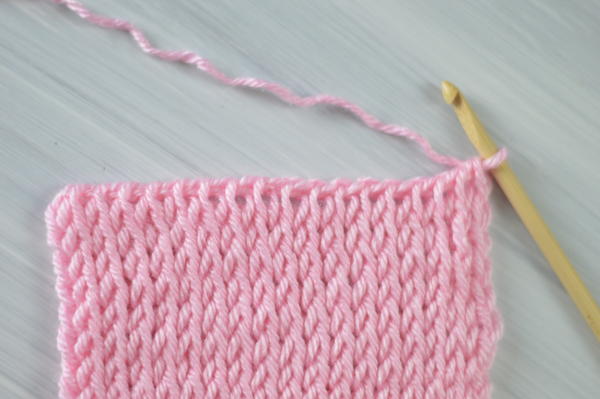
- Insert the hook into the next stitch. For example: If you have been using tks, insert the hook just like for a tks. (image 1 and 2)
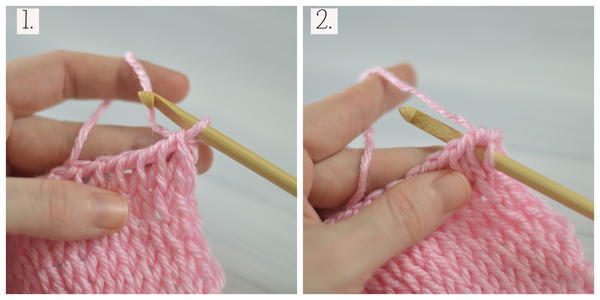
- Yarn over and draw through the stitch and the loop on the hook. You should have one loop on your hook. (image 1 and 2)
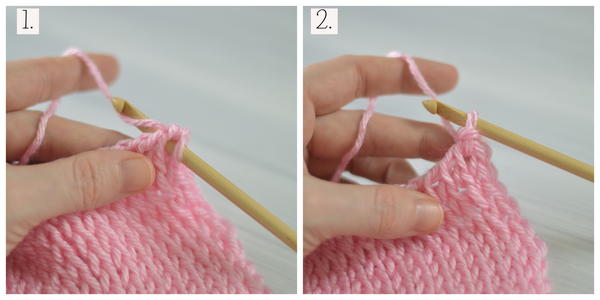
- Repeat step 2 across until 1 stitch remains. (below image)
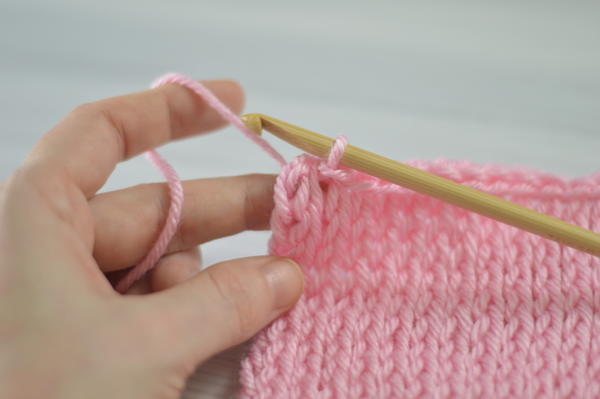
- Insert the hook into the last stitch behind the 2 vertical bars, yarn over and pull through the stitch and the loop on the hook. (image 1, 2, and 3)
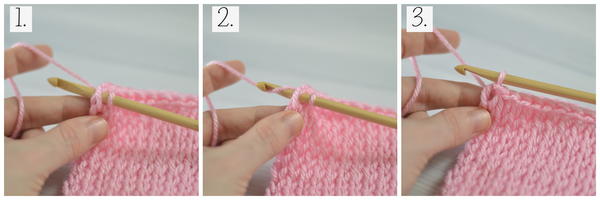
Cut the yarn, pull the yarn through and weave in the ends.
Up Next
28 Tunisian Crochet Patterns >>>
Have you ever tried afghan crochet?
Let us know about your experience!

